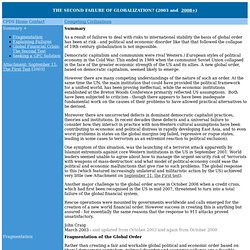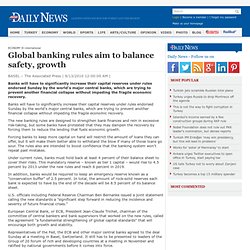

The Second Failure of Globalization? Seeking a GFC Solution Established machinery for international collaboration (eg G7, EU) made various attempts to promote a coordinated response to the GFC which would not only deal with the crisis but address its systemic causes.

A forum of European and Asian leaders agreed in October 2008 on the need for such action, and arrangements were made for an international meeting in the US in November following the 2008 presidential election to find a way forward. US Leadership? [<] Much was apparently expected of the renewal of US leadership within global institutions under a new president in developing solutions to the financial and rapidly-escalating economic crises. Show: why Why: In November 2008 there were worrying signs concerning the future Obama administration. G20: Avoiding Key Issues [<] A meeting of G20 nations (representing about 80% of the global economy) was arranged for mid-November 2008 to consider a coordinated response to the GFC. Taylor_Fri_645pm.pdf (application/pdf Object) Too Interconnected To Fail ESSEX. APEC as a Complex Adaptive System.
REVISITING MARKET EFFICIENCY Mauboussin - CAS PDF. Haldane speech PDF. Global banking rules aim to balance safety, growth - Hurriyet Daily News and Economic Review. ECONOMY er-international BASEL – The Associated Press | 9/13/2010 12:00:00 AM | Banks will have to significantly increase their capital reserves under rules endorsed Sunday by the world's major central banks, which are trying to prevent another financial collapse without impeding the fragile economic recovery.

The new banking rules are designed to strengthen bank finances and rein in excessive risk-taking, but some banks have protested that they may dampen the recovery by forcing them to reduce the lending that fuels economic growth. Forcing banks to keep more capital on hand will restrict the amount of loans they can offer, but it will make them better able to withstand the blow if many of those loans go sour.
The rules also are intended to boost confidence that the banking system won't repeat past mistakes. Under current rules, banks must hold back at least 4 percent of their balance sheet to cover their risks. "Government regulations tend to fix the last crisis," he said. Eco-economics - Could Biology explain the recession? What do you call a financier in search of the iron laws of human behaviour?

Answer: someone with a bad case of "physics envy". That is the peculiar psychological disorder diagnosed by Andrew Lo, a professor of financial engineering, as afflicting bankers and economists. Symptoms include a desperate search for the predictive certainty that comes from the hard sciences. At least since the 18th century, economists have been borrowing from physics, redeploying everything from thermodynamics and the "conservation of energy" principle to the understanding of macroeconomics and the generation of fancy derivatives. The global financial crisis has, however, seen financiers cast their scientific net further as they try to understand what went wrong and how to make the banking system more stable in future. The chart shows the global financial ecosystem in 2005. Nevertheless, no alternative intellectual model – or source of inspiration – has emerged to offer a truly coherent alternative.